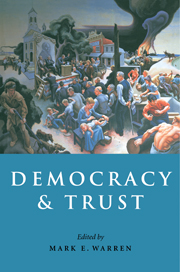Book contents
- Frontmatter
- Contents
- List of figures
- List of tables
- List of contributors
- Acknowledgments
- 1 Introduction
- 2 Do we want trust in government?
- 3 How can we trust our fellow citizens?
- 4 Trust, well-being and democracy
- 5 Democracy and social capital
- 6 Liberty against the democratic state: on the historical and contemporary sources of American distrust
- 7 Trust, voluntary association and workable democracy: the contemporary American discourse of civil society
- 8 Trust and its surrogates: psychological foundations of political process
- 9 Geographies of trust, geographies of hierarchy
- 10 Altruistic trust
- 11 Democratic theory and trust
- 12 Conclusion
- Index
4 - Trust, well-being and democracy
Published online by Cambridge University Press: 15 March 2010
- Frontmatter
- Contents
- List of figures
- List of tables
- List of contributors
- Acknowledgments
- 1 Introduction
- 2 Do we want trust in government?
- 3 How can we trust our fellow citizens?
- 4 Trust, well-being and democracy
- 5 Democracy and social capital
- 6 Liberty against the democratic state: on the historical and contemporary sources of American distrust
- 7 Trust, voluntary association and workable democracy: the contemporary American discourse of civil society
- 8 Trust and its surrogates: psychological foundations of political process
- 9 Geographies of trust, geographies of hierarchy
- 10 Altruistic trust
- 11 Democratic theory and trust
- 12 Conclusion
- Index
Summary
This chapter will demonstrate three points:
Interpersonal trust is a relatively enduring characteristic of given societies: it reflects the entire historical heritage of a given people, including economic, political, religious, and other factors.
Interpersonal trust (with other cultural factors) is conducive to stable democracy, as the political culture literature has long claimed but could not demonstrate directly.
Democratic institutions do not necessarily produce interpersonal trust. A society's political institutions are only one among many factors involved in the emergence of a culture of trust or distrust.
Thus, although the United States has had democratic institutions throughout the twentieth century, interpersonal trust among the US public has declined significantly during the past four decades. Democratic institutions do not automatically produce trust. There is no institutional quick fix for the problem of creating trust and social capital.
Let us examine each of these topics, starting with the historical rootedness of interpersonal trust. Our analysis utilizes empirical measures of culture from the 1990–1991 and 1995–1997 World Values Surveys, carried out in more than 60 societies around the world and representing more than 70 percent of the world's population.
Trust and economic development
The people of rich societies show higher levels of interpersonal trust than the publics of poorer ones. As we will see, the World Values Survey data demonstrate this point unequivocally; the correlation is very strong. Why is economic development so closely linked with interpersonal trust? Several plausible answers have been proposed.
- Type
- Chapter
- Information
- Democracy and Trust , pp. 88 - 120Publisher: Cambridge University PressPrint publication year: 1999
- 265
- Cited by



